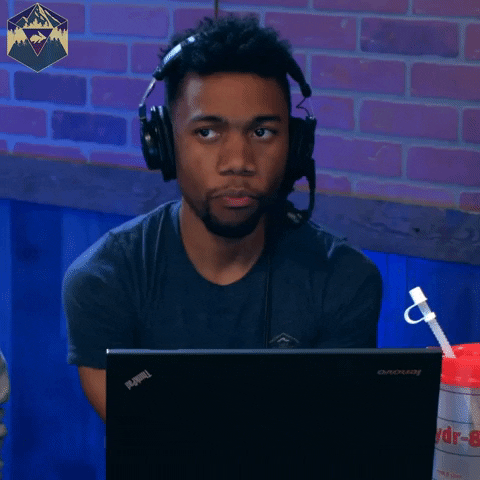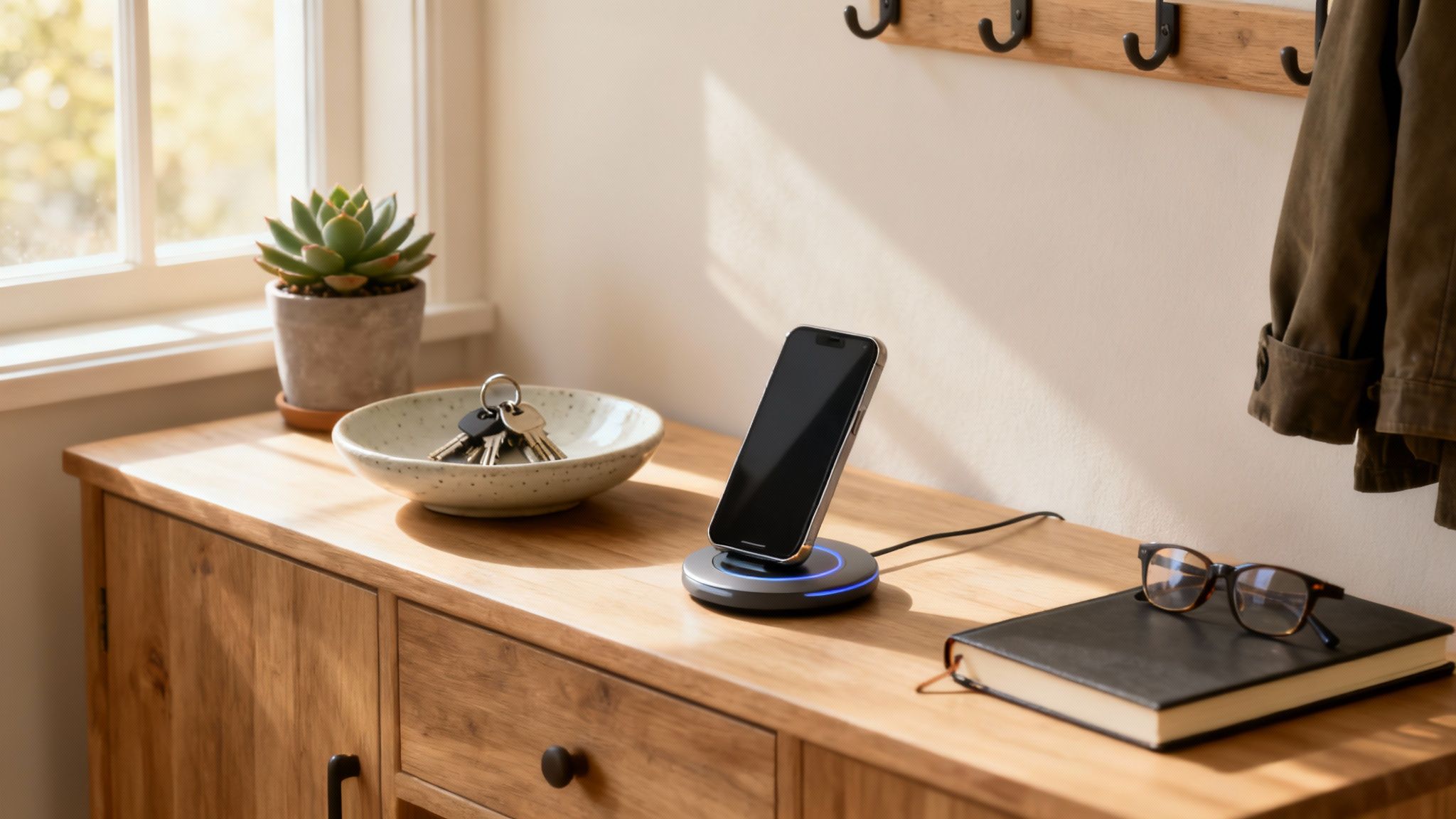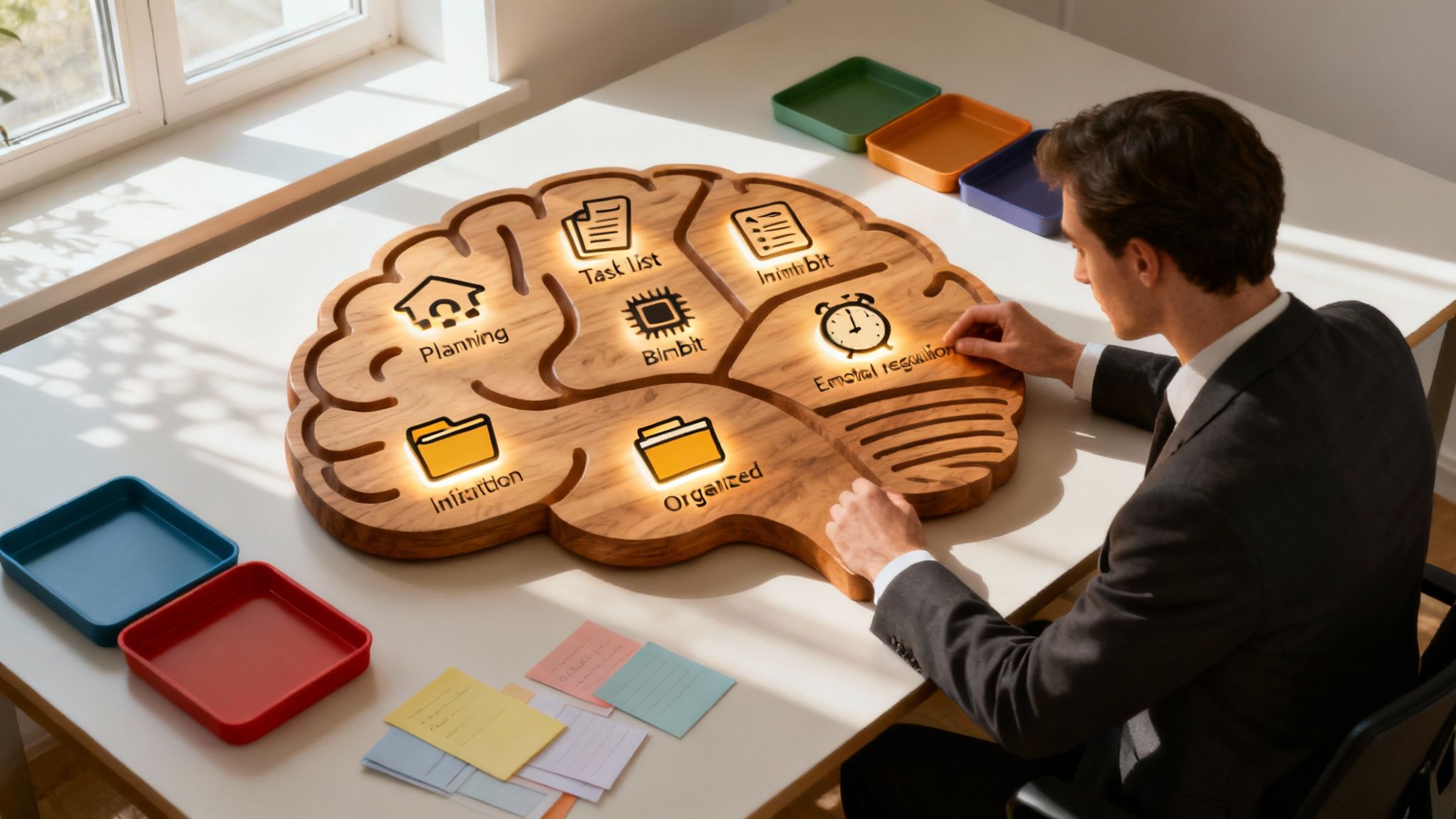Picture this: you're deep in a project when an email pops up. And once you've handled it—if you handle it. #EmailAnxiety—your phone vibrates. And the distractions keep pouring in. Before you know it, your concentration is shattered, and you've officially lost track of time. You try to return to your project but can't seem to find your groove.
Does this sound familiar? Read on for ADHD-specific strategies to help you concentrate through everyday distractions.
Too long; didn’t read
- ADHD brains work differently, often making focus more challenging.
- If you struggle with focusing, do one thing at a time. No more multitasking.
- Seek music, background noise, food, caffeine, or exercise stimulation to keep you on track.
- Don't try too many strategies at once.
- Be kind to yourself. This is hard enough as it is.
Why ADHD makes it hard to focus

Focus can be challenging for ADHDers. Attention-deficit/hyperactivity disorder may sound like someone would have less attention. Still, the reality is that they have lots of attention that's hard to point in the right direction, making staying on task pretty tricky.
Inattentive ADHD furthers that wrong impression. ADHDers may look calm but are often buzzing inside. It may look like inattention, but it's really overwhelming attention.
ADHD brains often have different neurotransmitter patterns (the chemical messengers that help communication within the brain and body). Medications adjust neurotransmitter levels—like dopamine—which tend to be lower in ADHD brains, making the medications helpful for focus.
But medication doesn't always work for everyone.
So, here are eight medication-free strategies to try to improve your focus with ADHD.
8 strategies for maintaining your attention and focus
"Focus is about saying no"
- Steve Jobs
Medication certainly helps, but it often works best alongside other focus strategies. For many people with ADHD, starting a new habit might be easy to plan but challenging to start and maintain.
Try one tip at a time to see what sticks.
1. Use a brain dump for your random thoughts.
Use a notebook and write down everything you're thinking or worried about forgetting. Once it's written, my brain stops buzzing, and I can get to work. You can also continue adding to this list to capture unrelated ideas anytime you need to.
💡 Pro tip! Check out our guide to making a brain dump and to-don't list to get started.
2. Stop multitasking and start monotasking.
Let's admit it: multitasking is complex, with or without ADHD. Doing multiple things invites distraction and can leave you too frustrated to finish anything.
Instead, try monotasking—work on one thing until it's done or for a set time.
- Get started single-tasking by using a Pomodoro timer (often free online).
- Focus for a specified time (20, 30, or 45 minutes)
- Take a break for about five minutes
- Repeat as needed.
Whenever you notice you're distracted, gently remind yourself to wait until the next break or focus session to engage with whatever distracted you.
💡 Pro tip! If you struggle with holding yourself accountable when it comes to focus sessions, consider finding a coworking session that aligns with your availability on the Inflow app. Take our free ADHD quiz here!
3. Limit your distractions.

Take time to notice what breaks your concentration and set boundaries during work. For example, I leave my computer in "do not disturb" mode to limit notifications.
Your phone doesn't need to buzz during the day, especially if you're easily distracted by notifications.
4. Exercise regularly, even if it's light.
Exercise can be especially hard for people with ADHD because, to the ADHD brain, repetition gets boring fast. And sure - you "should" exercise because it's healthy, but did you know that exercise increases your dopamine and focus?
Not a fan of jogging? Try movements you enjoy. It's okay - and even expected with ADHD - to change how you exercise. But, no matter how you do it, the point is to reap the benefits of movement.
5. Embrace the background noise (that you choose).
Many ADHDers like steady sounds for focus (e.g., a fan, rain, or a predictable beat). You've probably heard of white noise, but what are pink and brown noises? (Click the link to learn about how different sound colors can improve focus!)
Beyond colors, try other sounds. For example, I love crackling fireplaces, but birdsongs can be distracting.
6. Plan your workday.
Organize your day by using time as measurement. For example, checking your emails first thing might seem ideal, but what if that's when you're most productive? Maybe save the inbox for later and instead focus on your more challenging projects at that time.
💡 Pro tip! Experiment with time-blocking or chunking:
- Write out what you need to do that day (or week).
- Assign a chunk of time to each task.
- Set a timer.
7. Choose your music carefully.
Music can be helpful, but make sure it's the right kind. For most people with ADHD, vocals are distracting, especially if you know them by heart. Many people choose slow music like jazz, and others thrive with electronic music like deep house.
Your music should fade into your background. The music you choose might also depend on your task—doing taxes and cleaning your kitchen could need different tunes.
8. Fuel up throughout the day.
Take a moment to notice how you feel before and after a snack. Then, choose something with balanced protein, carbs, and fat to stay full longer. This also helps you avoid blood sugar crashes, which can cause dopamine levels to plummet.
For some, caffeine may be helpful, especially around mid-afternoon.
Final thoughts: slow and steady
By giving yourself grace, taking breaks, and listening to your body when tired, you set yourself up for productivity and success. Keep in mind that slow changes are easier to incorporate and have a better chance of becoming a permanent part of your lifestyle.
For more tips on improving focus, try the productivity modules on the Inflow app!







